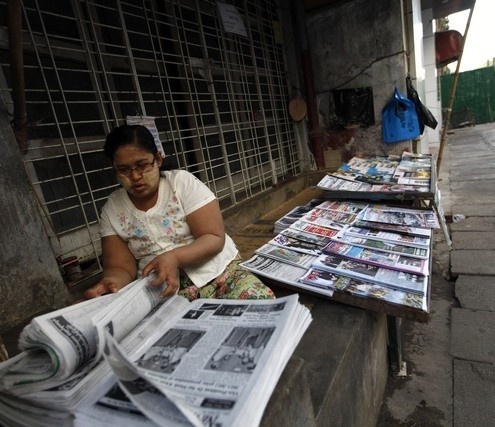The Burmese government has admitted that a new “supervisory committee” has been formed, which will carry out many of the same functions of the former censorship board, including monitoring media output and revoking publishing licences of newspapers deemed to “violate” regulations.
A spokesperson for the President’s Office told DVB that a group of dozens of high-ranking officials, including government, police and military intelligence, was formed in January to oversee the registration process for all media groups hoping to publish in Burma.
“The [censorship board] has been restructured as the Central Supervisory Committee for Registration and Distribution of Printers and Publishers – with a new name and new responsibilities,” Zaw Htay told DVB.
“Printers and publishers who violate the regulations will be punished by revoking the licenses.”
The committee was formed by presidential order on 23 January on the same day that the government formally abolished the censorship board. No official announcement was made and parliament was not informed.
The revelation follows news that the Ministry of Information is pushing through controversial new legislation, which prohibits the publication on various topics deemed to “violate” the military-backed constitution, “inflict damage” between ethnic groups and “disturb the rule of law”.
The draft law, which is set to replace the draconian 1962 Printers and Publishers Registration Act, requires all publications to register with the government or risk spending six months in jail if they are unable to pay a 10 million kyat (US$11,621) fine.
It also formally mandates a “registration official” to oversee the licencing process, although it is unclear how his role would interact with the new supervisory committee. The draft legislation was slated by media freedom campaigners, who described it as “utterly inconsistent” with international standards.
But Zaw Htay insisted “there is no more censorship” and that media “may publish freely” as long as they continue to do so in accordance with their publishing licences and “the principles in the constitution.”
“The committee has a responsibility to monitor writings and publications on politics, economy, social and religious issues; whether they meet the criteria suggested in their license,” he said.
He added that the committee will be also monitoring calendars, song lyrics, postcards, formal messages and graphic novels, as well as any documents and letters published by foreign embassies in Burmese.
Zaw Thet Htway, a well-known editor and member of Burma’s interim press council, told DVB that the new committee signals inherent government “distrust” of the media.
He added that its creation was a clear attempt to “keep censoring” and “controlling” the press, while the government claims “to be granting full democratic standards for the media.” “With this kind of attitude, I see there will be a lot of obstacles in building the new nation,” he warned.
On Saturday, state media announced that the committee had issued only eight daily publishing licences out of 14 scrutinised applicants. The Eleven Media Group, which has led a vocal campaign against recent media restrictions, was reportedly rejected for missing a 100 kyat (US$ 0.11) revenue stamp from its application.
Burma currently ranks 151 out of 179 on Reporters Without Borders’ press freedom index.



